WordPress is the go-to solution for millions. But have you ever considered turning this widespread WordPress usage into a thriving business opportunity? If you’re thinking about how to start a WordPress development agency, you’re in the right place.
WordPress stats show that WordPress Powers over 43% of all websites on the internet, making it a dominant force in the web development world. It’s user-friendly, highly customizable, and offers various features catering to beginners and experts. This versatility makes WordPress a preferred choice for many, opening doors for agencies to offer specific services tailored to WordPress users.
Starting your own WordPress development agency is an exciting and rewarding venture. It’s about leveraging the power of WordPress to build a successful business that not only creates beautiful websites but also adds value to the WordPress community. The opportunities are vast in building a WordPress business.
How to Start a WordPress Development Agency: Step by Step
Identifying Your Niche and Target Audience
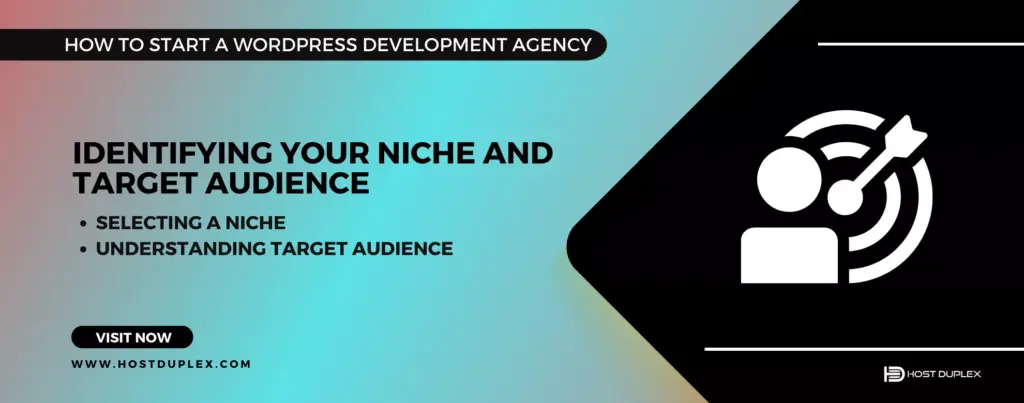
In the journey of starting your own agency, one of the most crucial steps is identifying your niche and understanding your target audience. This step lays the foundation for your WordPress agency business and ensures that your services resonate with the right people. Let’s explore how you can carve out your niche and connect with your ideal clients.
Selecting a Niche
Choosing a niche is about focusing on a specific area where you can excel. It’s about finding that sweet spot where your expertise meets the needs of a particular segment of the WordPress community. Selecting a niche doesn’t limit you; it defines you. It helps your WordPress development agency stand out in a crowded market and attracts clients who value your specific services.
Here’s how you can select your niche:
- Custom Themes Development: If you have a flair for design, creating custom WordPress themes could be your calling. Tailor themes to specific industries or styles, making them unique and appealing.
- Plugin Development: Are you a coding wizard? Developing plugins that enhance WordPress functionality can set you apart. From SEO tools to social media integrations, the possibilities are endless.
- E-commerce Solutions: With the rise of online shopping, offering e-commerce solutions for WordPress sites can be a lucrative niche. Focus on shopping carts, payment gateways, and user-friendly interfaces.
Understanding Your Target Audience
Knowing your target audience is about understanding their needs, preferences, and pain points. It’s about creating WordPress solutions that speak to them. Here’s how you can identify your target audience:
- Have Deep Thought About Your Company, Products, or Services: Reflect on what you offer and who would benefit most from it. If you sell baby strollers online, your target audience might be women aged 25 – 40 years old.
- Check the Other Competitors: Analyze what your competitors are doing. Visit their websites and social media to understand how they interact with their audience. Learn from their successes and mistakes.
- Create Reader Personas: Based on your research, create reader personas that represent your ideal clients. This helps in tailoring your content and services to meet their specific needs.
- Use the Right Tools for Finding an Audience: Tools like Google Analytics, Facebook’s Audience Insights, and Vertical Response can provide valuable insights into your audience’s behavior and preferences.
Planning and Structuring Your Agency
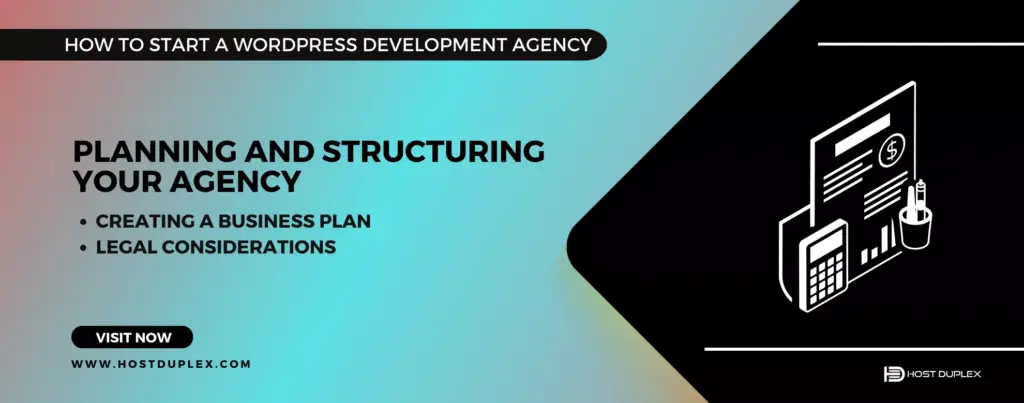
Creating a Business Plan
A well-crafted business plan is a roadmap for your WordPress 0business. It outlines your goals, strategies, and the path to success. Here’s what to include:
- Mission Statement: Define the core purpose of your agency. What makes you unique? What value do you bring to the WordPress community?
- Services Offered: Detail the specific services you’ll provide, whether it’s web design, plugin development, or maintenance services.
- Pricing Strategy: Outline your pricing model. Will you offer packages or customized quotes? Consider your overhead costs and desired profit margins.
- Marketing Strategy: Plan your marketing efforts to reach your target audience. Choose the channels that align with your clients, from content marketing to social media.
- Recurring Revenue Streams: Identify ways to create recurring revenue, such as maintenance services or subscription-based products.
Legal Considerations
Starting a WordPress agency involves legal considerations to protect your business and personal assets. Here’s what to keep in mind:
- Registering Your Agency: Choose the appropriate legal entity for your agency, such as a sole proprietorship, LLC, or corporation. Consult with appropriate authorities to ensure compliance.
- Intellectual Property Rights: Protect your work, including designs, code, and brand identity. Consider trademarks, copyrights, and patents where applicable.
- Contracts and Agreements: Draft clear and concise contracts for clients, freelancers, and partners. Outline the scope of work, payment terms, and other essential details.
Designing and Developing Your Agency’s Website
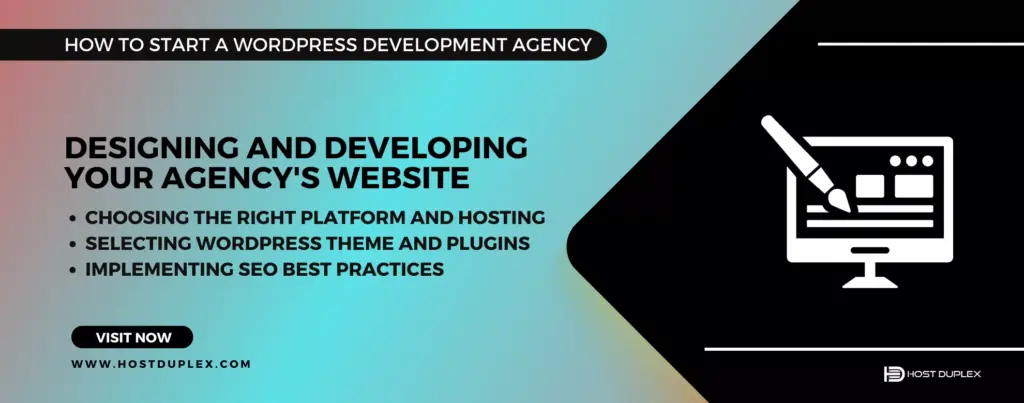
Choosing the Right Platform and Hosting
When building your agency’s website, the right platform and hosting provider are crucial. WordPress has emerged as a dominant force, powering more than 63% of the global CMS market. With over 59K plugins available, WordPress agencies have grown more prevalent, offering a wide array of services from web design to hosting solutions.
WordPress’s popularity isn’t just a fluke; it’s a result of consistent development, accessibility in multiple languages, and adaptability to various business needs. Brands like TED, NBC Sports, and TechCrunch have leveraged WordPress to create engaging and efficient websites.
Here’s how you can start your own WordPress agency by choosing the right platform and hosting:
Selecting a WordPress Hosting Provider
Great agencies know how to optimize everything, from designs to providing the right WordPress hosting solution for your website. Choose a hosting provider like Host Duplex that specializes in WordPress for optimal performance.
Selecting WordPress Theme and Plugins
Your agency’s brand identity should shine through your website. WordPress’s vast library of themes and plugins allows you to customize your agency website to reflect your brand identity and offer specific services. Whether you’re focusing on web design, plugin development, or e-commerce solutions, there’s a theme and set of plugins tailored to your needs.
Implementing SEO Best Practices
Search Engine Optimization (SEO) is a vital component of your WordPress development agency’s online success. Implementing SEO best practices ensures that your WordPress website is discoverable by search engines, ranks higher in search results, and reaches your target audience effectively. Here’s how you can implement SEO best practices for your agency’s website:
On-Page SEO
On-page SEO refers to optimizing individual web pages to rank higher and earn more relevant traffic. Here’s what you can do:
- Keyword Optimization: Use your focus keywords, long-tail keywords, and LSI keywords naturally within your content, titles, meta descriptions, and URLs.
- Content Quality: Create high-quality, engaging, and informative content that provides value to your readers.
- Internal Linking: Link to other relevant pages on your site to guide visitors and help search engines understand your site’s structure.
- Mobile Optimization: Ensure that your site is mobile-friendly, as Google considers mobile optimization a ranking factor.
Off-Page SEO
Off-page SEO refers to actions taken outside of your website to impact your rankings within search engine results pages (SERPs). Here’s how to approach it:
- Building Backlinks: Earn links from reputable sites to boost your site’s credibility and ranking.
- Social Media Engagement: Promote your content on social media platforms to increase visibility and drive traffic.
- Guest Posts: Write guest posts for industry blogs to establish authority and gain backlinks.
Technical SEO
Technical SEO involves optimizing your site’s backend structure, making it easier for search engines to crawl and index your site. Here’s what to focus on:
- Site Speed: Optimize your site’s loading time, as slow-loading pages can negatively impact user experience and rankings.
- XML Sitemap: Create and submit an XML sitemap to search engines to help them crawl your site more efficiently.
- Secure and Accessible Website: Implement HTTPS for a secure connection and ensure that your site’s robots.txt file allows search engines to access it.
- Structured Data: Use schema markup to help search engines understand your content better.
Building Your Team
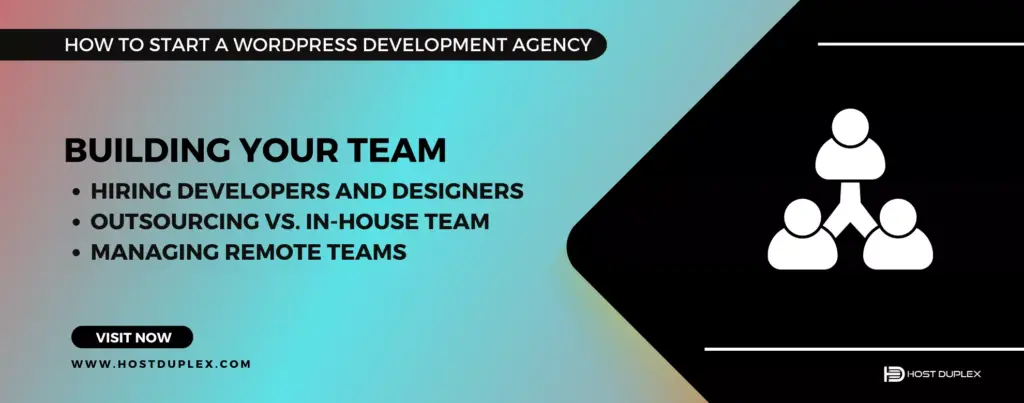
Building a strong and cohesive team is essential for the success of your WordPress development agency. Whether you’re hiring in-house skilled developers and designers or considering outsourcing, your team’s skills, collaboration, and communication will shape the quality of your services. Let’s explore how to build your team effectively.
Hiring Developers and Designers
Your agency’s reputation rests on the quality of your work, and that starts with hiring the right developers and designers. Here’s how to approach it:
- Skills and Qualifications: Look for individuals with proven expertise in WordPress development, web design, plugin development, and other areas relevant to your services.
- Collaboration and Communication: Ensure that potential hires can work well in a team and communicate effectively with clients and colleagues.
- Cultural Fit: Consider how candidates align with your agency’s values and culture. A good cultural fit can enhance teamwork and job satisfaction.
Outsourcing vs. In-House Team
Deciding between an in-house team and outsourcing is a critical decision that impacts your agency’s flexibility, control, and costs. Here’s how to weigh the pros and cons:
Pros and Cons of an In-House Team
- Pros: Greater control, better communication, alignment with company culture.
- Cons: Higher overhead costs and potential challenges in finding qualified local talent.
Pros and Cons of Outsourcing
- Pros: Access to a broader talent pool, potential cost savings, flexibility in scaling up or down.
- Cons: Possible communication barriers, less control over quality, potential challenges in maintaining brand consistency.
Managing Remote Teams
Managing remote teams is often part of running a WordPress development agency. Here’s how to do it effectively:
- Clear Communication: Establish clear communication channels and regular check-ins to keep everyone on the same page.
- Project Management Tools: Utilize project management tools like Asana or Trello to track progress and collaborate efficiently.
- Cultural Sensitivity: Understand and respect cultural differences if working with international team members. Foster an inclusive environment that values diversity.
Defining Your Services and Crafting Your Brand
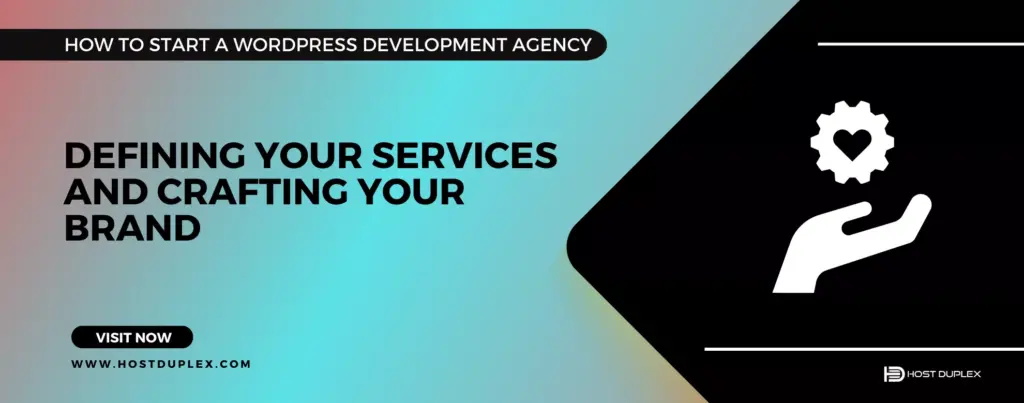
Your WordPress development agency’s success hinges on clear service definitions and a strong brand identity. This section will guide you through the process of defining your agency’s services and crafting a brand that resonates with your target audience.
Services Offered by WordPress Development Agencies
Defining your services is a critical step in establishing your agency. Here’s how to outline the types of services you’ll provide:
- Custom Development To meet specific client needs, offer tailored solutions, such as custom plugins and themes.
- Maintenance and Support: Provide ongoing support, updates, and maintenance to ensure clients’ WordPress sites remain secure and functional.
- SEO and Marketing: Enhance clients’ online presence with SEO improvements, content marketing, and social media engagement.
- Website Hosting and Maintenance: You can offer website hosting or partner with a website hosting provider and offer maintenance services.
Crafting Your Agency Brand
Your brand is more than just a logo; it’s the embodiment of your agency’s values, mission, and unique selling propositions. Here’s how to craft a compelling brand:
- Define Your Values: Decide what your agency stands for. It could be a commitment to open source, a focus on a specific industry or niche, or a dedication to quality and innovation.
- Design Your Visual Identity: Your logo and visual design are ongoing advertisements for your specific talents. Ensure they reflect the quality and creativity of your work.
- Create a Unique Selling Proposition (USP): Identify what sets your agency apart from competitors. It could be your specialized services, customer-centric approach, or innovative solutions.
- Align with Your Target Clientele: Tailor your brand to resonate with your target audience. For example, if non-profits are your focus, incorporate your commitment to philanthropy into your brand.
Marketing and Client Acquisition
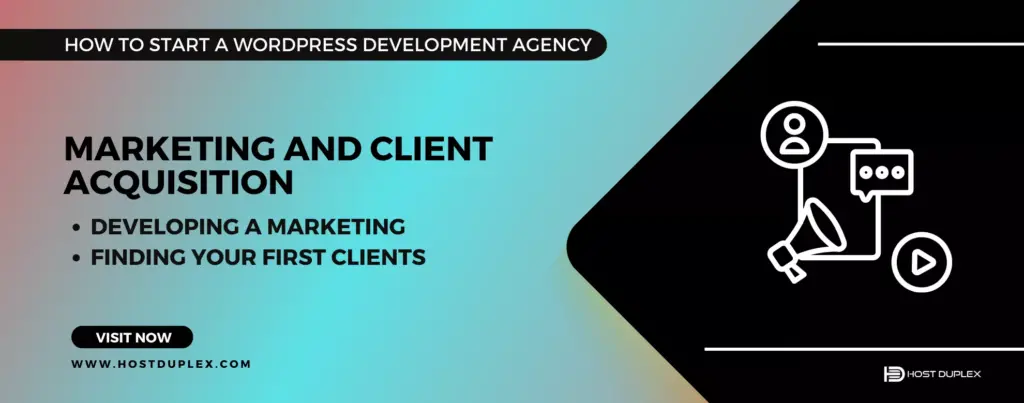
Developing a Marketing Plan
A robust marketing plan is the cornerstone of your agency’s growth. Here’s how to develop a marketing strategy that resonates with your target audience:
Content Marketing: Create valuable, relevant content that showcases your expertise in WordPress development, design, and other related services.
Social Media Marketing: Engage with your audience on platforms like LinkedIn, Twitter, and Facebook. Share insights, updates, and connect with industry influencers.
Paid Advertising: Utilize platforms like Google Ads to target specific demographics and drive traffic to your agency’s website.
SEO: Optimize your website and content with relevant keywords and best practices to rank higher in search engine results.
Finding Your First Clients
Finding your first clients is a significant milestone for your WordPress development agency. Here’s how to approach it:
Networking and Outreach: Attend industry events, join online forums, and leverage your existing network to connect with potential clients.
Partnerships and Collaborations: Collaborate with other agencies or industry professionals to expand your reach and offer complementary services.
Client Testimonials and Case Studies: Showcase successful projects and client testimonials to build credibility and attract new clients.
Offer Free Workshops or Webinars: Provide free educational content to demonstrate your expertise and connect with potential clients.
Project Management and Client Relations
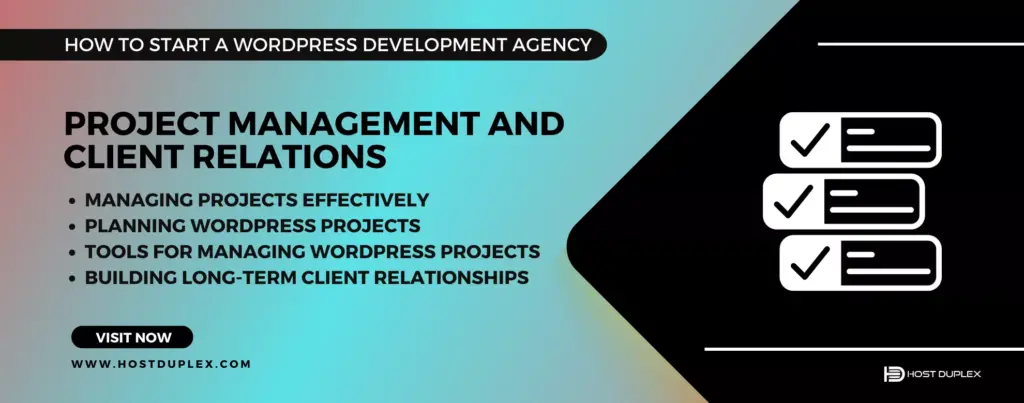
Managing Projects Effectively
Project management is an important aspect of running a successful WordPress development agency. It ensures that projects are completed on time, within budget, and meet the client’s expectations.
Why Project Management is Important for WordPress Agencies?
Effective project management leads to higher efficiency, better client satisfaction, and increased recommendations. It’s the backbone of a successful WordPress agency business.
A well-designed workflow is dynamic and adaptable. It includes planning, executing, monitoring, and closing projects. Workflows build on each other, leading to better cooperation and support within the team.
Planning WordPress Projects
Planning is the first step in managing WordPress projects. It involves defining goals, asking the right questions, outlining the project plan, and coordinating with the team. Proper planning ensures that the project stays on track and meets the client’s needs.
Tools for Managing WordPress Projects
Various tools can assist in project management, including Asana, Trello, Microsoft Project, and Teams, Slack, and Zapier. These tools facilitate collaboration, communication, and tracking, making the project management process smoother.
Building Long-Term Client Relationships
Client Satisfaction
Ensuring client satisfaction through quality work, timely delivery, and excellent communication leads to repeat business and positive referrals.
Retention Strategies
Implementing strategies to retain clients, such as offering additional services, regular updates, and personalized support, can create a loyal client base.
Upselling and Cross-Selling
Understanding the client’s needs and offering additional services or products that align with their goals can lead to increased revenue and stronger client relationships.
Scaling Your WordPress Development Agency
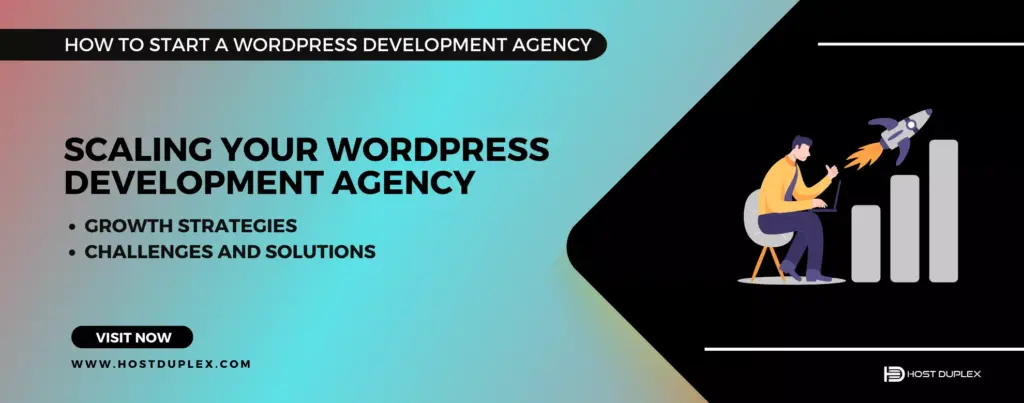
Scaling your WordPress development agency involves expanding services, entering new markets, forming strategic partnerships, and overcoming challenges. This section will guide you through the growth strategies and solutions to common obstacles that may arise as you scale your agency.
Growth Strategies
Growing your WordPress development agency requires a strategic approach. Here’s how to expand your agency:
Expanding Services: Offer additional services like SEO, content marketing, or e-commerce solutions to provide more value to existing clients and attract new ones.
Entering New Markets: Explore opportunities in different industries, regions, or niches to reach a broader audience.
Strategic Partnerships: Collaborate with other agencies, freelancers, or industry experts to enhance your offerings and reach new clients.
Challenges and Solutions
Scaling your agency comes with its own set of challenges. Here’s how to navigate common obstacles:
Common Obstacles
- Finding and training new team members can be time-consuming and costly.
- Ensuring consistent quality across expanded services and larger client bases.
- Balancing resources between existing clients and new opportunities.
Risk Management
Implement strategies to mitigate risks, such as diversifying client portfolios, implementing quality control measures, and investing in employee development.
Continuous Improvement
Foster a culture of continuous improvement by regularly evaluating processes, gathering feedback, and implementing enhancements.
Conclusion
Starting and scaling a WordPress development agency is an exciting journey filled with opportunities and challenges. This guide has provided you with a comprehensive roadmap to navigate the various aspects of building a successful WordPress agency. Here is a recap of the key steps of starting your own WordPress business we discussed in this guide:
- Understanding the landscape and identifying opportunities.
- Selecting your focus areas and understanding your clients.
- Creating a business plan, legal considerations, and developing your agency’s website.
- Hiring strategies and team management.
- Outlining your offerings and building a strong brand identity.
- Developing a marketing plan and finding your first clients.
- Managing projects effectively and building long-term client relationships.
- Growth strategies and overcoming challenges.
With careful planning, dedication, and a focus on continuous improvement, you can build an agency that not only meets your client’s needs but also provides a fulfilling and profitable career path for you and your team.
If you have any questions or need further assistance, feel free to contact us. We also offer specialized WordPress hosting services to support your agency’s growth. Explore our hosting plans and take the first step towards building your own successful WordPress agency today!

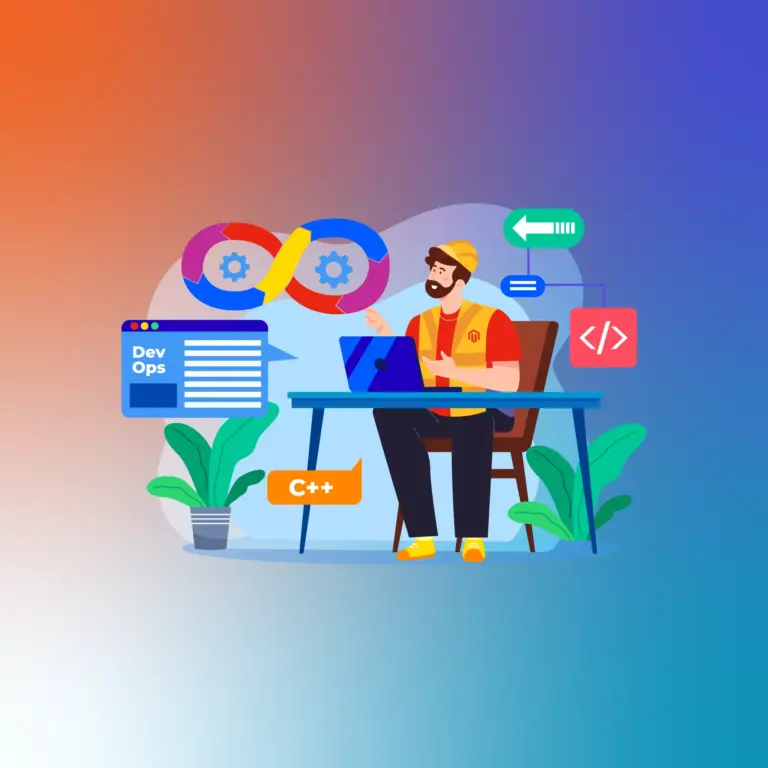
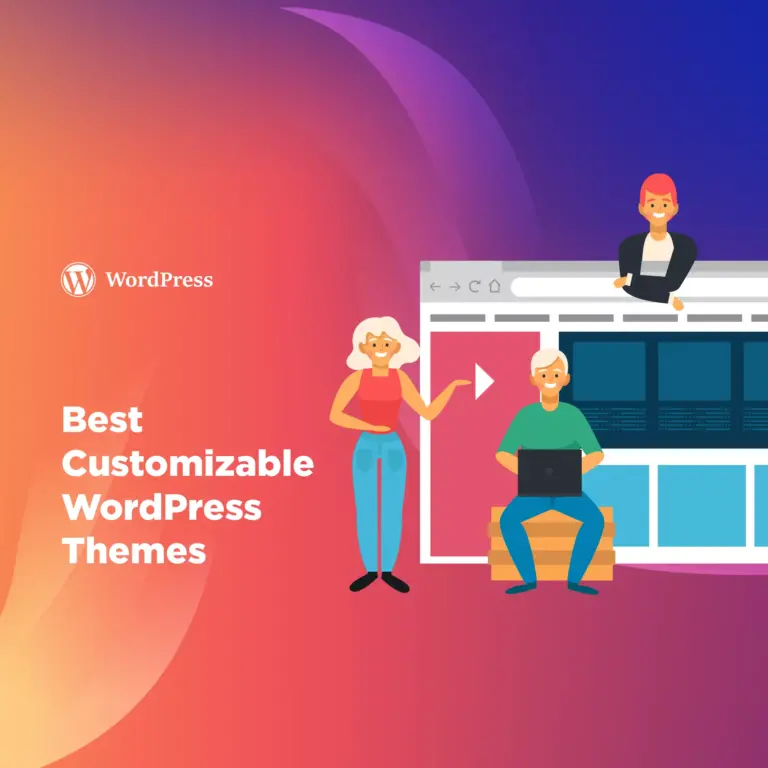
How to Start a WordPress Development Agency: Best Guide (2023)